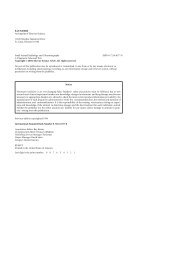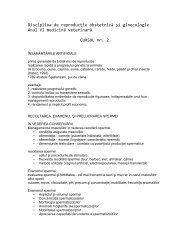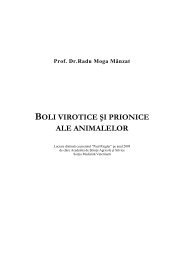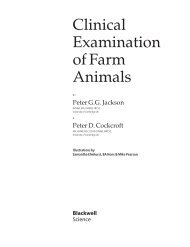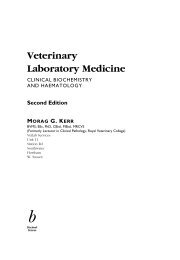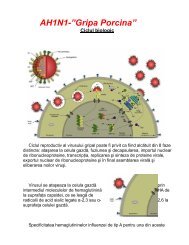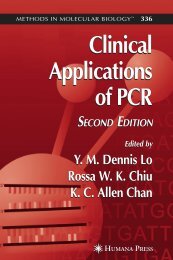- Page 1 and 2:
An imprint of Elsevier Limited © E
- Page 3 and 4:
CONTRIBUTORS Matthias J Kleinz Depa
- Page 5 and 6:
Dedication To Tom, Rosalind and Jim
- Page 7 and 8:
CHAPTER 1 PRINCIPLES OF CLINICAL PH
- Page 9 and 10:
CHAPTER 1 PRINCIPLES OF CLINICAL PH
- Page 11 and 12:
CHAPTER 1 PRINCIPLES OF CLINICAL PH
- Page 13 and 14:
CHAPTER 1 PRINCIPLES OF CLINICAL PH
- Page 15 and 16:
CHAPTER 1 PRINCIPLES OF CLINICAL PH
- Page 17 and 18:
CHAPTER 1 PRINCIPLES OF CLINICAL PH
- Page 19 and 20:
CHAPTER 1 PRINCIPLES OF CLINICAL PH
- Page 21 and 22:
CHAPTER 1 PRINCIPLES OF CLINICAL PH
- Page 23 and 24:
CHAPTER 1 PRINCIPLES OF CLINICAL PH
- Page 25 and 26:
CHAPTER 1 PRINCIPLES OF CLINICAL PH
- Page 27 and 28:
CHAPTER 1 PRINCIPLES OF CLINICAL PH
- Page 29 and 30:
CHAPTER 1 PRINCIPLES OF CLINICAL PH
- Page 31 and 32:
CHAPTER 1 PRINCIPLES OF CLINICAL PH
- Page 33 and 34:
CHAPTER 2 CLINICAL PHARMACOKINETICS
- Page 35 and 36:
CHAPTER 2 CLINICAL PHARMACOKINETICS
- Page 37 and 38:
CHAPTER 2 CLINICAL PHARMACOKINETICS
- Page 39 and 40:
CHAPTER 2 CLINICAL PHARMACOKINETICS
- Page 41 and 42:
CHAPTER 2 CLINICAL PHARMACOKINETICS
- Page 43 and 44:
CHAPTER 2 CLINICAL PHARMACOKINETICS
- Page 45 and 46:
CHAPTER 2 CLINICAL PHARMACOKINETICS
- Page 47 and 48:
CHAPTER 3 ADVERSE DRUG REACTIONS Un
- Page 49 and 50:
CHAPTER 3 ADVERSE DRUG REACTIONS to
- Page 51 and 52:
CHAPTER 3 ADVERSE DRUG REACTIONS
- Page 53 and 54:
CHAPTER 3 ADVERSE DRUG REACTIONS He
- Page 55 and 56:
CHAPTER 3 ADVERSE DRUG REACTIONS an
- Page 57 and 58:
CHAPTER 3 ADVERSE DRUG REACTIONS wh
- Page 59 and 60:
CHAPTER 3 ADVERSE DRUG REACTIONS at
- Page 61 and 62:
CHAPTER 3 ADVERSE DRUG REACTIONS Ps
- Page 63 and 64:
CHAPTER 3 ADVERSE DRUG REACTIONS su
- Page 65 and 66:
CHAPTER 4 THE PHARMACOLOGY OF THE A
- Page 67 and 68:
CHAPTER 4 THE PHARMACOLOGY OF THE A
- Page 69 and 70:
CHAPTER 4 THE PHARMACOLOGY OF THE A
- Page 71 and 72:
CHAPTER 4 THE PHARMACOLOGY OF THE A
- Page 73 and 74:
CHAPTER 4 THE PHARMACOLOGY OF THE A
- Page 75 and 76:
CHAPTER 4 THE PHARMACOLOGY OF THE A
- Page 77 and 78:
CHAPTER 4 THE PHARMACOLOGY OF THE A
- Page 79 and 80:
CHAPTER 4 THE PHARMACOLOGY OF THE A
- Page 81 and 82:
CHAPTER 4 THE PHARMACOLOGY OF THE A
- Page 83 and 84:
CHAPTER 4 THE PHARMACOLOGY OF THE A
- Page 85 and 86:
CHAPTER 4 THE PHARMACOLOGY OF THE A
- Page 87 and 88:
CHAPTER 4 THE PHARMACOLOGY OF THE A
- Page 89 and 90:
CHAPTER 5 ANESTHETIC AGENTS However
- Page 91 and 92:
CHAPTER 5 ANESTHETIC AGENTS The gre
- Page 93 and 94:
CHAPTER 5 ANESTHETIC AGENTS Table 5
- Page 95 and 96:
CHAPTER 5 ANESTHETIC AGENTS doses.
- Page 97 and 98:
CHAPTER 5 ANESTHETIC AGENTS ● hig
- Page 99 and 100:
CHAPTER 5 ANESTHETIC AGENTS concent
- Page 101 and 102:
CHAPTER 5 ANESTHETIC AGENTS X R 3 C
- Page 103 and 104:
CHAPTER 5 ANESTHETIC AGENTS Emergen
- Page 105 and 106:
CHAPTER 5 ANESTHETIC AGENTS inhalat
- Page 107 and 108:
CHAPTER 5 ANESTHETIC AGENTS and enh
- Page 109 and 110:
CHAPTER 5 ANESTHETIC AGENTS ● Exc
- Page 111 and 112:
CHAPTER 5 ANESTHETIC AGENTS Pharmac
- Page 113 and 114:
CHAPTER 5 ANESTHETIC AGENTS Central
- Page 115 and 116:
CHAPTER 5 ANESTHETIC AGENTS Table 5
- Page 117 and 118:
CHAPTER 5 ANESTHETIC AGENTS FURTHER
- Page 119 and 120:
CHAPTER 6 SEDATIVES ● noradrenali
- Page 121 and 122:
CHAPTER 6 SEDATIVES treatment, with
- Page 123 and 124:
CHAPTER 6 SEDATIVES Benzodiazepines
- Page 125 and 126:
CHAPTER 6 SEDATIVES It is not misci
- Page 127 and 128:
CHAPTER 6 SEDATIVES respectively. H
- Page 129 and 130:
CHAPTER 6 SEDATIVES Table 6.1 Sugge
- Page 131 and 132:
7 Behavior-modifying drugs Kersti S
- Page 133 and 134:
CHAPTER 7 BEHAVIOR-MODIFYING DRUGS
- Page 135 and 136:
CHAPTER 7 BEHAVIOR-MODIFYING DRUGS
- Page 137 and 138:
CHAPTER 7 BEHAVIOR-MODIFYING DRUGS
- Page 139 and 140:
CHAPTER 7 BEHAVIOR-MODIFYING DRUGS
- Page 141 and 142:
CHAPTER 7 BEHAVIOR-MODIFYING DRUGS
- Page 143 and 144:
CHAPTER 7 BEHAVIOR-MODIFYING DRUGS
- Page 145 and 146:
CHAPTER 7 BEHAVIOR-MODIFYING DRUGS
- Page 147 and 148:
CHAPTER 7 BEHAVIOR-MODIFYING DRUGS
- Page 149 and 150:
CHAPTER 7 BEHAVIOR-MODIFYING DRUGS
- Page 151 and 152:
CHAPTER 7 BEHAVIOR-MODIFYING DRUGS
- Page 153 and 154:
8 Antibacterial drugs Jill E Maddis
- Page 155 and 156:
CHAPTER 8 ANTIBACTERIAL DRUGS phary
- Page 157 and 158:
CHAPTER 8 ANTIBACTERIAL DRUGS dose
- Page 159 and 160:
CHAPTER 8 ANTIBACTERIAL DRUGS Table
- Page 161 and 162:
CHAPTER 8 ANTIBACTERIAL DRUGS Table
- Page 163 and 164:
CHAPTER 8 ANTIBACTERIAL DRUGS Bacte
- Page 165 and 166:
CHAPTER 8 ANTIBACTERIAL DRUGS lacta
- Page 167 and 168:
CHAPTER 8 ANTIBACTERIAL DRUGS Antis
- Page 169 and 170:
CHAPTER 8 ANTIBACTERIAL DRUGS intri
- Page 171 and 172:
CHAPTER 8 ANTIBACTERIAL DRUGS Table
- Page 173 and 174:
CHAPTER 8 ANTIBACTERIAL DRUGS inter
- Page 175 and 176:
CHAPTER 8 ANTIBACTERIAL DRUGS Teico
- Page 177 and 178:
CHAPTER 8 ANTIBACTERIAL DRUGS less
- Page 179 and 180:
CHAPTER 8 ANTIBACTERIAL DRUGS Diffe
- Page 181 and 182:
CHAPTER 8 ANTIBACTERIAL DRUGS forms
- Page 183 and 184:
CHAPTER 8 ANTIBACTERIAL DRUGS ● I
- Page 185 and 186:
CHAPTER 8 ANTIBACTERIAL DRUGS In an
- Page 187 and 188:
CHAPTER 8 ANTIBACTERIAL DRUGS ● R
- Page 189 and 190:
CHAPTER 8 ANTIBACTERIAL DRUGS RIFAM
- Page 191 and 192:
9 Systemic antifungal therapy Josep
- Page 193 and 194:
CHAPTER 9 SYSTEMIC ANTIFUNGAL THERA
- Page 195 and 196:
CHAPTER 9 SYSTEMIC ANTIFUNGAL THERA
- Page 197 and 198:
CHAPTER 9 SYSTEMIC ANTIFUNGAL THERA
- Page 199 and 200:
CHAPTER 9 SYSTEMIC ANTIFUNGAL THERA
- Page 201 and 202:
CHAPTER 9 SYSTEMIC ANTIFUNGAL THERA
- Page 203 and 204:
10 Antiparasitic drugs Stephen W Pa
- Page 205 and 206:
CHAPTER 10 ANTIPARASITIC DRUGS ●
- Page 207 and 208:
CHAPTER 10 ANTIPARASITIC DRUGS Tabl
- Page 209 and 210:
CHAPTER 10 ANTIPARASITIC DRUGS Tabl
- Page 211 and 212:
CHAPTER 10 ANTIPARASITIC DRUGS Tabl
- Page 213 and 214:
CHAPTER 10 ANTIPARASITIC DRUGS Tabl
- Page 215 and 216:
CHAPTER 10 ANTIPARASITIC DRUGS leva
- Page 217 and 218:
CHAPTER 10 ANTIPARASITIC DRUGS ●
- Page 219 and 220:
CHAPTER 10 ANTIPARASITIC DRUGS Adve
- Page 221 and 222:
CHAPTER 10 ANTIPARASITIC DRUGS Mech
- Page 223 and 224:
CHAPTER 10 ANTIPARASITIC DRUGS Form
- Page 225 and 226:
CHAPTER 10 ANTIPARASITIC DRUGS Mech
- Page 227 and 228:
CHAPTER 10 ANTIPARASITIC DRUGS Tabl
- Page 229 and 230:
CHAPTER 10 ANTIPARASITIC DRUGS prod
- Page 231 and 232:
CHAPTER 10 ANTIPARASITIC DRUGS Lufe
- Page 233 and 234:
CHAPTER 10 ANTIPARASITIC DRUGS Adve
- Page 235 and 236:
CHAPTER 10 ANTIPARASITIC DRUGS 62.5
- Page 237 and 238:
CHAPTER 10 ANTIPARASITIC DRUGS incr
- Page 239 and 240:
CHAPTER 10 ANTIPARASITIC DRUGS rest
- Page 241 and 242:
CHAPTER 10 ANTIPARASITIC DRUGS The
- Page 243 and 244:
CHAPTER 10 ANTIPARASITIC DRUGS 238
- Page 245 and 246:
CHAPTER 10 ANTIPARASITIC DRUGS Tabl
- Page 247 and 248:
CHAPTER 10 ANTIPARASITIC DRUGS In a
- Page 249 and 250:
CHAPTER 10 ANTIPARASITIC DRUGS func
- Page 251 and 252:
CHAPTER 10 ANTIPARASITIC DRUGS Para
- Page 253 and 254:
CHAPTER 10 ANTIPARASITIC DRUGS Para
- Page 255 and 256:
CHAPTER 10 ANTIPARASITIC DRUGS Para
- Page 257 and 258:
CHAPTER 10 ANTIPARASITIC DRUGS Para
- Page 259 and 260:
CHAPTER 10 ANTIPARASITIC DRUGS Para
- Page 261 and 262:
CHAPTER 10 ANTIPARASITIC DRUGS Para
- Page 263 and 264:
CHAPTER 10 ANTIPARASITIC DRUGS Para
- Page 265 and 266:
CHAPTER 10 ANTIPARASITIC DRUGS Para
- Page 267 and 268:
CHAPTER 11 GLUCOCORTICOSTEROIDS AND
- Page 269 and 270:
CHAPTER 11 GLUCOCORTICOSTEROIDS AND
- Page 271 and 272:
CHAPTER 11 GLUCOCORTICOSTEROIDS AND
- Page 273 and 274:
CHAPTER 11 GLUCOCORTICOSTEROIDS AND
- Page 275 and 276:
12 Immunomodulatory therapy Michael
- Page 277 and 278:
CHAPTER 12 IMMUNOMODULATORY THERAPY
- Page 279 and 280:
CHAPTER 12 IMMUNOMODULATORY THERAPY
- Page 281 and 282:
CHAPTER 12 IMMUNOMODULATORY THERAPY
- Page 283 and 284:
CHAPTER 12 IMMUNOMODULATORY THERAPY
- Page 285 and 286:
CHAPTER 12 IMMUNOMODULATORY THERAPY
- Page 287 and 288:
CHAPTER 12 IMMUNOMODULATORY THERAPY
- Page 289 and 290:
CHAPTER 12 IMMUNOMODULATORY THERAPY
- Page 291 and 292:
CHAPTER 12 IMMUNOMODULATORY THERAPY
- Page 293 and 294:
CHAPTER 13 NONSTEROIDAL ANTI-INFLAM
- Page 295 and 296:
CHAPTER 13 NONSTEROIDAL ANTI-INFLAM
- Page 297 and 298:
CHAPTER 13 NONSTEROIDAL ANTI-INFLAM
- Page 299 and 300:
CHAPTER 13 NONSTEROIDAL ANTI-INFLAM
- Page 301 and 302:
CHAPTER 13 NONSTEROIDAL ANTI-INFLAM
- Page 303 and 304:
CHAPTER 13 NONSTEROIDAL ANTI-INFLAM
- Page 305 and 306:
CHAPTER 13 NONSTEROIDAL ANTI-INFLAM
- Page 307 and 308:
CHAPTER 13 NONSTEROIDAL ANTI-INFLAM
- Page 309 and 310:
CHAPTER 13 NONSTEROIDAL ANTI-INFLAM
- Page 311 and 312:
CHAPTER 13 NONSTEROIDAL ANTI-INFLAM
- Page 313 and 314:
CHAPTER 13 NONSTEROIDAL ANTI-INFLAM
- Page 315 and 316:
CHAPTER 14 OPIOID ANALGESICS inflam
- Page 317 and 318:
A Agonist opioid (morphine) B Parti
- Page 319 and 320:
CHAPTER 14 OPIOID ANALGESICS admini
- Page 321 and 322:
CHAPTER 14 OPIOID ANALGESICS may ac
- Page 323 and 324:
CHAPTER 14 OPIOID ANALGESICS Small
- Page 325 and 326:
CHAPTER 14 OPIOID ANALGESICS Clinic
- Page 327 and 328:
CHAPTER 14 OPIOID ANALGESICS Contra
- Page 329 and 330:
CHAPTER 14 OPIOID ANALGESICS respon
- Page 331 and 332:
CHAPTER 14 OPIOID ANALGESICS Advers
- Page 333 and 334:
CHAPTER 14 OPIOID ANALGESICS Advers
- Page 335 and 336:
15 Cancer chemotherapy Jane M Dobso
- Page 337 and 338:
CHAPTER 15 CANCER CHEMOTHERAPY to m
- Page 339 and 340:
CHAPTER 15 CANCER CHEMOTHERAPY curr
- Page 341 and 342:
CHAPTER 15 CANCER CHEMOTHERAPY Tabl
- Page 343 and 344:
CHAPTER 15 CANCER CHEMOTHERAPY Clin
- Page 345 and 346:
CHAPTER 15 CANCER CHEMOTHERAPY sion
- Page 347 and 348:
CHAPTER 15 CANCER CHEMOTHERAPY In t
- Page 349 and 350:
CHAPTER 15 CANCER CHEMOTHERAPY afte
- Page 351 and 352:
CHAPTER 15 CANCER CHEMOTHERAPY Phar
- Page 353 and 354:
CHAPTER 15 CANCER CHEMOTHERAPY Form
- Page 355 and 356:
CHAPTER 15 CANCER CHEMOTHERAPY conc
- Page 357 and 358:
CHAPTER 15 CANCER CHEMOTHERAPY ●
- Page 359 and 360:
CHAPTER 15 CANCER CHEMOTHERAPY Phar
- Page 361 and 362:
CHAPTER 15 CANCER CHEMOTHERAPY in t
- Page 363 and 364:
CHAPTER 15 CANCER CHEMOTHERAPY Adve
- Page 365 and 366:
CHAPTER 15 CANCER CHEMOTHERAPY best
- Page 367 and 368: CHAPTER 15 CANCER CHEMOTHERAPY Form
- Page 369 and 370: CHAPTER 15 CANCER CHEMOTHERAPY baso
- Page 371 and 372: CHAPTER 15 CANCER CHEMOTHERAPY D-MA
- Page 373 and 374: CHAPTER 16 ANTICONVULSANT DRUGS sei
- Page 375 and 376: CHAPTER 16 ANTICONVULSANT DRUGS bit
- Page 377 and 378: CHAPTER 16 ANTICONVULSANT DRUGS Kno
- Page 379 and 380: CHAPTER 16 ANTICONVULSANT DRUGS Mec
- Page 381 and 382: CHAPTER 16 ANTICONVULSANT DRUGS rap
- Page 383 and 384: CHAPTER 16 ANTICONVULSANT DRUGS exc
- Page 385 and 386: 17 Drugs used in the management of
- Page 387 and 388: CHAPTER 17 DRUGS USED IN THE MANAGE
- Page 389 and 390: CHAPTER 17 DRUGS USED IN THE MANAGE
- Page 391 and 392: CHAPTER 17 DRUGS USED IN THE MANAGE
- Page 393 and 394: CHAPTER 17 DRUGS USED IN THE MANAGE
- Page 395 and 396: CHAPTER 17 DRUGS USED IN THE MANAGE
- Page 397 and 398: CHAPTER 17 DRUGS USED IN THE MANAGE
- Page 399 and 400: CHAPTER 17 DRUGS USED IN THE MANAGE
- Page 401 and 402: CHAPTER 17 DRUGS USED IN THE MANAGE
- Page 403 and 404: CHAPTER 17 DRUGS USED IN THE MANAGE
- Page 405 and 406: CHAPTER 17 DRUGS USED IN THE MANAGE
- Page 407 and 408: CHAPTER 17 DRUGS USED IN THE MANAGE
- Page 409 and 410: CHAPTER 17 DRUGS USED IN THE MANAGE
- Page 411 and 412: CHAPTER 17 DRUGS USED IN THE MANAGE
- Page 413 and 414: CHAPTER 17 DRUGS USED IN THE MANAGE
- Page 415 and 416: CHAPTER 17 DRUGS USED IN THE MANAGE
- Page 417: CHAPTER 17 DRUGS USED IN THE MANAGE
- Page 421 and 422: CHAPTER 17 DRUGS USED IN THE MANAGE
- Page 423 and 424: CHAPTER 17 DRUGS USED IN THE MANAGE
- Page 425 and 426: CHAPTER 17 DRUGS USED IN THE MANAGE
- Page 427 and 428: CHAPTER 17 DRUGS USED IN THE MANAGE
- Page 429 and 430: CHAPTER 17 DRUGS USED IN THE MANAGE
- Page 431 and 432: CHAPTER 17 DRUGS USED IN THE MANAGE
- Page 433 and 434: CHAPTER 17 DRUGS USED IN THE MANAGE
- Page 435 and 436: CHAPTER 17 DRUGS USED IN THE MANAGE
- Page 437 and 438: CHAPTER 17 DRUGS USED IN THE MANAGE
- Page 439 and 440: CHAPTER 17 DRUGS USED IN THE MANAGE
- Page 441 and 442: CHAPTER 17 DRUGS USED IN THE MANAGE
- Page 443 and 444: CHAPTER 17 DRUGS USED IN THE MANAGE
- Page 445 and 446: CHAPTER 17 DRUGS USED IN THE MANAGE
- Page 447 and 448: CHAPTER 17 DRUGS USED IN THE MANAGE
- Page 449 and 450: CHAPTER 17 DRUGS USED IN THE MANAGE
- Page 451 and 452: CHAPTER 17 DRUGS USED IN THE MANAGE
- Page 453 and 454: CHAPTER 17 DRUGS USED IN THE MANAGE
- Page 455 and 456: CHAPTER 17 DRUGS USED IN THE MANAGE
- Page 457 and 458: CHAPTER 17 DRUGS USED IN THE MANAGE
- Page 459 and 460: CHAPTER 17 DRUGS USED IN THE MANAGE
- Page 461 and 462: CHAPTER 17 DRUGS USED IN THE MANAGE
- Page 463 and 464: 18 Drugs used in the management of
- Page 465 and 466: CHAPTER 18 DRUGS USED IN THE MANAGE
- Page 467 and 468: CHAPTER 18 DRUGS USED IN THE MANAGE
- Page 469 and 470:
CHAPTER 18 DRUGS USED IN THE MANAGE
- Page 471 and 472:
CHAPTER 18 DRUGS USED IN THE MANAGE
- Page 473 and 474:
CHAPTER 18 DRUGS USED IN THE MANAGE
- Page 475 and 476:
CHAPTER 19 GASTROINTESTINAL DRUGS C
- Page 477 and 478:
CHAPTER 19 GASTROINTESTINAL DRUGS r
- Page 479 and 480:
CHAPTER 19 GASTROINTESTINAL DRUGS
- Page 481 and 482:
CHAPTER 19 GASTROINTESTINAL DRUGS c
- Page 483 and 484:
CHAPTER 19 GASTROINTESTINAL DRUGS w
- Page 485 and 486:
CHAPTER 19 GASTROINTESTINAL DRUGS c
- Page 487 and 488:
CHAPTER 19 GASTROINTESTINAL DRUGS F
- Page 489 and 490:
CHAPTER 19 GASTROINTESTINAL DRUGS i
- Page 491 and 492:
CHAPTER 19 GASTROINTESTINAL DRUGS L
- Page 493 and 494:
CHAPTER 19 GASTROINTESTINAL DRUGS P
- Page 495 and 496:
CHAPTER 19 GASTROINTESTINAL DRUGS F
- Page 497 and 498:
CHAPTER 19 GASTROINTESTINAL DRUGS c
- Page 499 and 500:
CHAPTER 19 GASTROINTESTINAL DRUGS Z
- Page 501 and 502:
CHAPTER 19 GASTROINTESTINAL DRUGS
- Page 503 and 504:
20 Drugs used in the management of
- Page 505 and 506:
CHAPTER 20 DRUGS USED IN THE MANAGE
- Page 507 and 508:
CHAPTER 20 DRUGS USED IN THE MANAGE
- Page 509 and 510:
CHAPTER 20 DRUGS USED IN THE MANAGE
- Page 511 and 512:
CHAPTER 20 DRUGS USED IN THE MANAGE
- Page 513 and 514:
CHAPTER 20 DRUGS USED IN THE MANAGE
- Page 515 and 516:
CHAPTER 21 DRUGS USED IN THE TREATM
- Page 517 and 518:
CHAPTER 21 DRUGS USED IN THE TREATM
- Page 519 and 520:
CHAPTER 21 DRUGS USED IN THE TREATM
- Page 521 and 522:
CHAPTER 21 DRUGS USED IN THE TREATM
- Page 523 and 524:
CHAPTER 22 DRUGS USED IN THE TREATM
- Page 525 and 526:
CHAPTER 22 DRUGS USED IN THE TREATM
- Page 527 and 528:
CHAPTER 22 DRUGS USED IN THE TREATM
- Page 529 and 530:
CHAPTER 22 DRUGS USED IN THE TREATM
- Page 531 and 532:
CHAPTER 22 DRUGS USED IN THE TREATM
- Page 533 and 534:
23 Drugs and reproduction Philip G
- Page 535 and 536:
CHAPTER 23 DRUGS AND REPRODUCTION I
- Page 537 and 538:
CHAPTER 23 DRUGS AND REPRODUCTION F
- Page 539 and 540:
CHAPTER 23 DRUGS AND REPRODUCTION C
- Page 541 and 542:
CHAPTER 23 DRUGS AND REPRODUCTION M
- Page 543 and 544:
CHAPTER 23 DRUGS AND REPRODUCTION F
- Page 545 and 546:
CHAPTER 23 DRUGS AND REPRODUCTION n
- Page 547 and 548:
CHAPTER 23 DRUGS AND REPRODUCTION E
- Page 549 and 550:
CHAPTER 23 DRUGS AND REPRODUCTION F
- Page 551 and 552:
24 Topical dermatological therapy R
- Page 553 and 554:
CHAPTER 24 TOPICAL DERMATOLOGICAL T
- Page 555 and 556:
CHAPTER 24 TOPICAL DERMATOLOGICAL T
- Page 557 and 558:
CHAPTER 24 TOPICAL DERMATOLOGICAL T
- Page 559 and 560:
CHAPTER 24 TOPICAL DERMATOLOGICAL T
- Page 561 and 562:
CHAPTER 24 TOPICAL DERMATOLOGICAL T
- Page 563 and 564:
CHAPTER 25 OCULAR CLINICAL PHARMACO
- Page 565 and 566:
CHAPTER 25 OCULAR CLINICAL PHARMACO
- Page 567 and 568:
CHAPTER 25 OCULAR CLINICAL PHARMACO
- Page 569 and 570:
CHAPTER 25 OCULAR CLINICAL PHARMACO
- Page 571 and 572:
CHAPTER 25 OCULAR CLINICAL PHARMACO
- Page 573 and 574:
CHAPTER 25 OCULAR CLINICAL PHARMACO
- Page 575 and 576:
CHAPTER 25 OCULAR CLINICAL PHARMACO
- Page 577 and 578:
CHAPTER 25 OCULAR CLINICAL PHARMACO
- Page 579 and 580:
Index A α-adrenergic receptors 70,
- Page 581 and 582:
INDEX Antiplatelet drugs 456-457 pi
- Page 583 and 584:
INDEX Ceftazidime 168 Ceftiofur 166
- Page 585 and 586:
INDEX Drug receptors 4-8 Drug-drug
- Page 587 and 588:
INDEX Hepatic excretion 33 Hepatic
- Page 589 and 590:
INDEX Metabolism dogs vs cats 47 an
- Page 591 and 592:
INDEX Pentazocine 319, 327 Pentobar
- Page 593 and 594:
INDEX Semicarbazone 230 Septic arth



